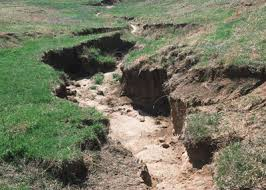 As described in the Equine Best Management Practices manual, sediment and erosion control measures are permanent or temporary practices to prevent sediment loss from fields, slow water flow, and/or trap and collect debris and sediments in runoff water.
As described in the Equine Best Management Practices manual, sediment and erosion control measures are permanent or temporary practices to prevent sediment loss from fields, slow water flow, and/or trap and collect debris and sediments in runoff water.
There are management techniques to lessen the effects of erosion and sedimentation on your farm. Initially, you should ensure that there is sufficient vegetative cover surrounding sloped terrain or shifting soils. The removal of vegetation will result in erosion of topsoil which will inevitably reroute the runoff of storm water and increase sedimentation in water sources in the area. The increase in sedimentation will cloud the water and reduce the amount of sunlight that can reach the plants growing on the bottom of the lake, stream, or river.
- Erosion can be mitigated by prescribed grazing, which is accounting for the natural vegetation and not allowing livestock to completely denude the area. Installing filter strips is a method in which additional vegetation is planted between production areas and water bodies. These vegetative strips decrease the velocity of runoff and work to eliminate sediment before it reaches the water source.
- Highly traveled areas such as water sources, covered salt/mineral areas, or shelters in your pastures will be a challenge to keep constant vegetation so locating these areas away from water bodies and in flat regions will help prevent erosion and runoff of the sediment. Try to avoid removing vast amounts of vegetation when constructing on your farm; the use of silt fences are beneficial when doing construction as they aid in trapping sediment while the land is being disturbed.
- Always use erosion control measures gradually, starting with the methods that are easiest to impose such as changing the grazing method of your animals and planting filter strips of vegetation and if needed using more aggressive treatment such as sediment traps. Minimizing the amount of sediment that reaches nearby water bodies will ultimately reduce the negative water quality impacts.
The most imperative point in erosion control is to prevent over grazing of your land, this goes back to my previous article on small farm management. If you have any questions or would like to discuss your farm in more detail, please contact me: Caitlin Bainum, UF/IFAS & Marion County Extension Services (352) 671-8792 OR cbainum@ufl.edu
 0
0
